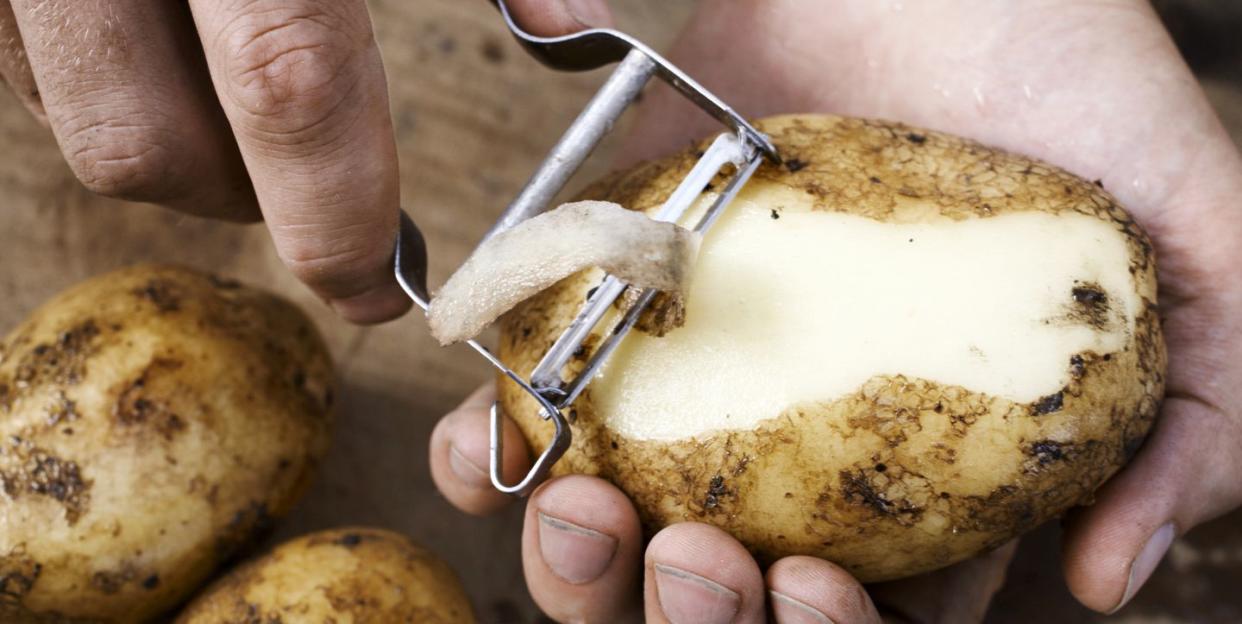Pass the Potatoes: Spuds Improve Performance Just As Well As Gels

Consuming potato puree during endurance exercise maintains blood sugar and boosts performance as well as energy gels do, according to a new study published in the Journal of Applied Physiology.
Trained cyclists who consumed potato puree during a cycling challenge performed identically well to those taking commercial gels, and 6.5 minutes faster than those taking no carbohydrates.
The potato-eating cyclists experienced more GI issues toward the end of the test, likely because of the high volume needed.
Science has now proven what potato-loving, Tour-de-France climb crusher Toms Skujiņš (Trek-Segafredo) has long proclaimed: Skinless spuds make great race fuel.
In fact, they work just as well as commercial gels, according to a study of endurance-trained competitive cyclists published in the Journal of Applied Physiology.
For the study, which was supported by the Alliance for Potato Research & Education (yes, that is an actual thing) the researchers had 12 cyclists perform a two-hour cycling challenge that included high intensity intervals and recovery periods, followed by a time trial to mimic the demands of an actual race.
The cyclists then were divided into three fueling groups: carbohydrate gels, potato puree, or no carbs (just water) and repeated the cycling tests. Both carb groups got 15 grams of carbs, in either gel or potato form, every 15 minutes to deliver 60 grams of carbs per hour, the standard amount recommended during endurance cycling racing.
The researchers monitored the rider’s cycling performance as well as other performance indicators, like blood sugar levels, blood lactate, heart rate, rating of perceived exertion, gastric emptying (how long food stays in your gut), and GI symptoms like bloating and gas.
The energy gel and the potato-fueled riders enjoyed identical time trial improvements, both performing the test in an average of 33 minutes, compared to the no-carb riders who completed the TT in 39.5 minutes.
The gel and potato fueled riders saw similar increases in blood sugar and heart rate, and reported that their efforts felt relatively easier for their power output compared to the no-carb cyclists. The lactate levels were higher at the end of the time trial in the carb-fueled riders, because they were going harder and cranking out more watts.
“Potatoes are a promising alternative for athletes because they represent a cost-effective, nutrient-dense and whole-food source of carbohydrates,” the researchers reported in the journal.
The research team also appreciated that potatoes require less processing and packaging than commercially produced energy gels.
“I’m generally interested in more sustainable solutions to performance nutrition approaches,” lead researcher Nicholas Burd, Ph.D., associate professor at University of Illinois at Urbana-Champaign told Bicycling.
[Build a killer midsection in the kitchen for powerful, effortless miles on the road with Eat for Abs!]
The fact that potatoes are savory is another big plus, Burd said. “Some of the applied performance nutritionists in the research group were interested in identifying a savory [fueling] option to minimize flavor fatigue that is commonly associated with the repeated use of gels.”
To that end, potatoes may be best incorporated as part of a diverse fueling strategy rather than a sole source of carbs: Though the spud-fueled riders generally tolerated the potato puree, they did experience more GI symptoms like bloating and gas by the end of the cycling trial than their gel-fueled peers.
The higher rate of GI issues was likely because the cyclists had to eat more potato—4.5 ounces per dose versus 0.8 ounces of carbohydrate gel—to get the necessary prescribed amount of carbohydrates.
It would also be pretty tough to carry all that potato in your pockets. So it might be best to save your spuds for prerace eats and/or a nice midride treat when you’re weary of sweet concentrated carbs like gels.
Finally, in case you’re hoping this gives you the green light to house a bag of potato chips before your next TT, it doesn’t. “The fat content and slower gastric emptying rate might be a deal breaker,” Burd said.
You Might Also Like

